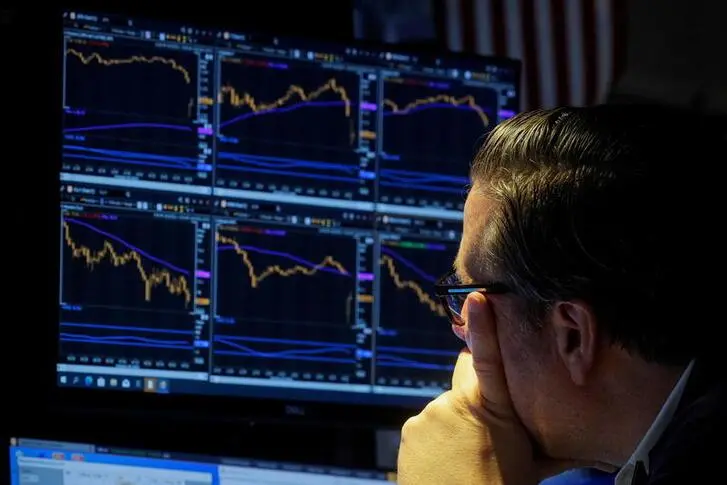PHOTO
SYDNEY- Stock markets slipped on Thursday and safe havens such as government bonds, gold and the yen were supported in Asia, as a hint of uneasiness crept in over the outlook for interest rates and growth, particularly outside of the United States.
Oil prices skidded to a six-week low on concern about a supply overhang and the prospect of China, Japan and the United States dipping into their fuel reserves, with Brent futures last at $79.77, more than 8% off last month's three-year high.
The risk-sensitive Australian dollar also fell to a six-week trough of $0.7256.
Japan's Nikkei was down 0.6% in early trade. MSCI's broadest index of Asian shares outside Japan dropped 0.5% and S&P 500 futures were flat after the index eased a little bit overnight.
The mood was softest in Hong Kong where concern over the earnings outlook weighed on tech stocks and an almost 5% drop in heavyweight Alibaba dragged the Hang Seng about 1% lower.
"We do seem to have stalled somewhat as we head into the year end," said Jun Bei Liu, a portfolio manager at Tribeca Investment Partners in Sydney.
"Investors perhaps are just taking a bit of pause," she said, in the wake of a strong U.S. results season, but as inflation and China's slowdown loom as macroeconomic headwinds.
The yen, a safe-haven asset which has also lately been sensitive to oil prices, had its sharpest one-day jump against the dollar in three months on Wednesday while gold rose almost 1% and Treasuries rallied along the curve.
Gold rose a further 0.1% to $1,869 an ounce in Asia on Thursday. The yen edged up to 113.94 per dollar.
Benchmark 10-year Treasury yields were steady in Tokyo at 1.5889% after falling about 5.5 basis points overnight.
The day ahead is quiet on the calendar, with appearances from central bankers in Australia, the United States and Europe and U.S. jobless claims data the highlights.
BIG DOLLAR
Against the backdrop of apparent caution is a surging U.S. dollar, as U.S. data has turned surprisingly strong just as doubts have arisen over the outlook for other major economies.
On Wednesday figures showed a jump in building permits and the backlog of house construction rose to a 15-year high - underscoring strong demand on the heels of a better-than-expected retail sales report on Tuesday. read more
By contrast Europe is grappling with a fourth wave of COVID-19 cases and fresh restrictions to curb it, while the central bank is pushing back on pressure to raise rates. read more
The euro has recovered from a trip below $1.13 on Wednesday but remains shaky at $1.1325 and is braced for its worst month on the dollar since June when the Federal Reserve had surprised investors with a hawkish shift in tone.
Currency traders are also assessing a sharp downdraft in the Aussie/yen cross, often a barometer of market sentiment. It fell through its 200-day moving average on Tuesday and has lost almost 4% in a dozen sessions .
"You've got the perfect storm there for bears," said Matt Simpson, senior analyst at brokerage City Index. "Fundamentally and technically Aussie/yen looks pretty good with lower oil prices."
Reporting by Tom Westbrook in Sydney Editing by Shri Navaratnam
© Reuters News 2021





















